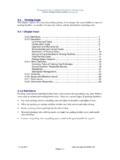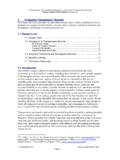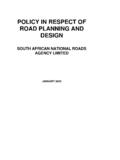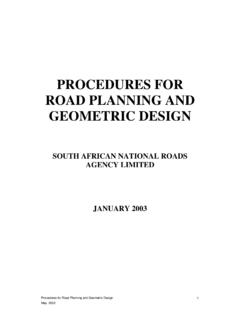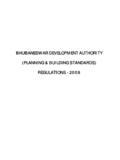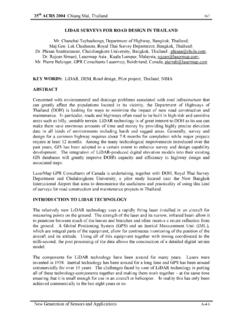Transcription of Planning Principles and Practices - vtpi.org
1 250-360-1560 Todd Alexander Litman 2006-2011 You are welcome and encouraged to copy, distribute, share and excerpt this document, provided the author is given attribution. Please send your corrections, comments and suggestions for improvement. Planning Principles and Practices 12 March 2013 by Todd Litman Victoria Transport Policy Institute Abstract Planning refers to the process of deciding what to do and how to do it. This paper summarizes key Principles and Practices for effective Planning , particularly land use and transportation Planning . Effective Planning takes into account diverse perspectives and impacts, allowing decision-makers to identify and implement the most effective ways to achieve goals.
2 Planning Principles and Practices Victoria Transport Policy Institute 2 A vision without a plan is just a dream. A plan without a vision is just drudgery. But a vision with a plan can change the world. Proverb Preface Planning is a noble but underappreciated profession. Planners help communities create their preferred future good Planning makes progress toward paradise while bad Planning leaves a legacy of problems and disputes. Planners perform civilization s heavy lifting by anticipating and resolving community conflicts. Good Planning requires special skills and perspectives: Most people prefer to ignore problems until they become unavoidable. Planners are professional worriers who seek out potential problems so they can be mitigated.
3 Most people look at a problem from a single perspective. Planners are responsible for considering multiple perspectives; they ask what is best for everybody overall? Most people prefer simple problems and solutions. Planners learn to appreciate complexity, and search for deeper meanings and underlying causes. Planners learn to work with uncertainty and ambiguity. Most people consider compromise a sign of weakness and failure. Planners are passionate about compromise because it resolves conflicts and often leads to better solutions. Most people prefer to consider one issue at a time. Planners apply integrated analysis, so individual, short-term decisions are consistent with multiple, long-term goals.
4 According to Harvard University Professor Daniel Gilbert (2006), the human species greatest and most unique ability is to imagine and anticipate objects and episodes that do not currently exist, that is, to plan for the future. That is our individual and collective strength. Planners are the coaches. Traditional communities relied on shaman and priests to help maintain balance between the human and natural worlds. In modern communities these responsibilities are borne by planners. Yet, planners often receive little respect. Our successes are taken for granted, and we are often blamed for failures beyond our control. As coordinators of public decision-making, planners are lightening rods to criticism.
5 Our role as unbiased facilitators is often misinterpreted as heartless bureaucrats. Stakeholders frequently hold planners personally responsible when dissatisfied with outcomes. Planners need diplomatic skills and a thick skin: if we do our job well we are criticized approximately equally by all sides. A family physician who emphasizes preventive health strategies (reducing tobacco consumption, eating balanced diets, regular exercise, etc.) often provides far greater total benefits with far less total costs than a surgeon who intervenes during a critical illness. Yet the family doctor is considered an annoying nag while the surgeon is considered a hero. Similarly, good Planning tends to be undervalued because it prevents problems, so the people who benefit are unaware of their gains.
6 So go forth and toil noble planners! Take heart that your efforts, although underappreciated, are essential to your community s wellbeing and creation of earthly paradise. Planning Principles and Practices Victoria Transport Policy Institute 3 Introduction Planning refers to the process of deciding what to do and how to do it. Planning occurs at many levels, from day-to-day decisions made by individuals and families, to complex decisions made by businesses and governments. This paper focuses on community land use and transport Planning , but most Principles described apply to any Planning activity. Planners are professionals who facilitate decision-making. Planners do not make decisions themselves; rather, they support decision-makers (managers, public officials, citizens) by coordinating information and activities.
7 Their role is to create a logical, systematic decision-making process that results in the best actions. Although grounded in the mundane, planners help nurture a community s deepest aspirations, such as love, hope and beauty. Planners translate theoretical goals into specific actions. Planning is an art as well as a science. It requires judgment, sensitivity and creativity. Planning often deals with in-between issues and so requires perception of what artists call negative space (spaces between objects). For example, architects are concerned with building designs while planners are concerned with the spaces between buildings. Similarly, planners are responsible for integrating various transport system components (walkways, parking facilities, driveways, roads, terminals, ports, etc.)
8 They create connections between different agencies, sectors and jurisdictions. As a result, planners must collaborate with diverse interest groups. Planners facilitate change and so must overcome entrenched Practices and interests. We often encounter resistance from people who assume that what they consider normal must be good, that is, people who look back to the past rather than forward to the future. For example, efforts to improve transport system efficiency by encouraging use of alternative modes often face resistance from people accustomed to automobile travel. I just want to be able to drive where I want, they argue, implying that such a demand is reasonable, even if accommodating additional vehicle traffic is increasingly costly.
9 In their role as objective negotiators, planners are often in the middle of conflicts. They often have the most knowledge about a project and its likely impacts of a particular decision, and so are often responsible for anticipating unintended consequences and representing the interests of people who are underrepresented in the decision-making process, such as children, the poor and future generations. Of course, planners are not infallible; we can make inaccurate predictions and bad recommendations, and a Planning process can encounter unexpected problems. But Planning failures stand out because they are unusual. Planners who follow professional Practices generally do a pretty good job of identifying the best course of action.
10 Be warned: Planning can be frustrating! There are many ways that a Planning process can fail, including inadequate resources, inadequate public or official support, and unresolved conflicts. Planners often work for years on projects that are implemented ineffectively or not at all. However, if Planning were easy, it wouldn t be as much fun! Planning Principles and Practices Victoria Transport Policy Institute 4 Planning Principles Good Planning requires a methodical process that clearly defines the steps that lead to optimal solutions. This process should reflect the following Principles : Comprehensive all significant options and impacts are considered. Efficient the process should not waste time or money.



